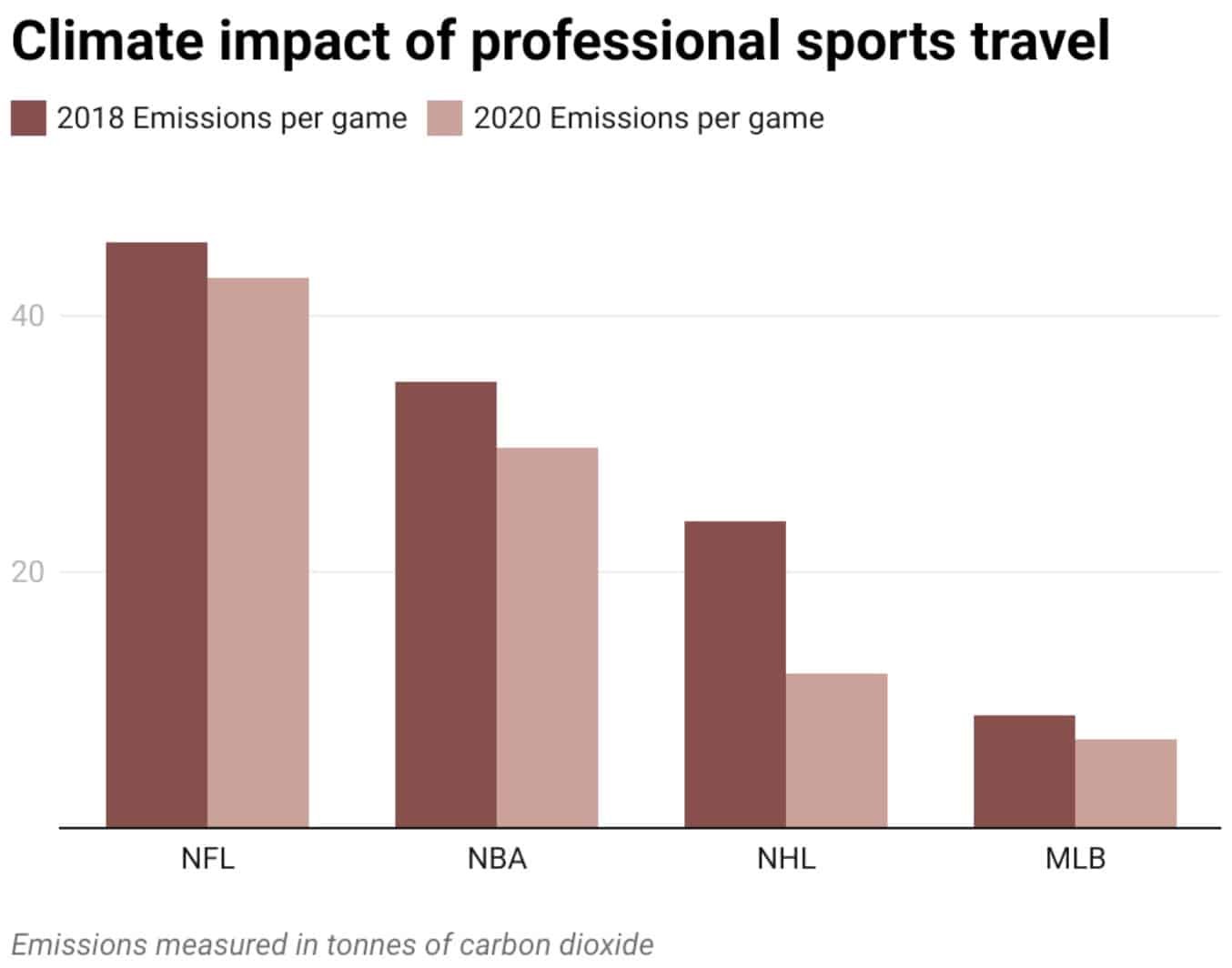One of the National Football League (NFL) teams, the Houston Texans, will buy carbon credits from Occidental Petroleum subsidiary, 1PointFive, to offset the footprint of their flights to other cities.
From soccer or football to basketball, sports are fun and recreational but some of them can be worse for the environment. But simply throwing a ball around is not the problem; it’s the professional part of big-arena sports, especially the logistics behind the event that poses a concern.
American football, for instance, is one of the most popular and profitable sports in the world. Fans are so passionate that many are willing to travel anywhere to see the game and their favorite team play live.
- 85% of GHG emissions by major sports events come from the travel and accommodation of fans.
Add to this the separate carbon emissions of each football team for their air travel like NFL.
Some teams have a large entourage of nearly two hundred people traveling for each game. This includes players, coaches, front office staff, equipment staff, and all the equipment.
Carbon Footprint of NFL
Together, the four major North American sports leagues – NBA, NHL, MLB, and NFL – emitted around 122,000 metric tons of CO2 from air travel alone.
And among them, it’s the football league that has the least carbon emissions as it has the fewest games. But the NFL also has the most carbon footprint per game.
- In fact, the carbon footprint of the NFL during a one-day event in the 2005 Super Bowl reached 1 million tons. That’s equal to ~900,000 metric tons of carbon footprint.
In an estimate, here’s a comparison of the four professional leagues’ travel emissions. The NFL has the highest carbon footprint for 2018 and 2020, despite the decrease due to the pandemic.

But the football league has been working hard to address the carbon emissions of its major game events. The league created an environmental program called “NFL Green”.
Leaving a Green Legacy
NFL Green projects ensure that the league’s big game or event makes a lasting impact in each host community. Since 1993, the program has earned recognition for the Super Bowl as the greenest professional sports event in America.
An example projects is a coral reef restoration along the South Florida coast. Others include recycling and tree planting in a local city park – Eagles Forest.
In 2019, the NFL joined the Green Sports Alliance — an environmental effort that includes 600+ teams, leagues, and venues. They’re committed to reducing waste, conserving energy and water, and other measures to slash footprint while increasing the sustainability of professional sports.
The NFL Green’s director once said in an interview:
“One thing is how do we mitigate the environmental impacts? How do we lighten the footprint? And the second thing is how do we create an enduring green legacy that we can leave behind in each community?”
NFL Green also works closely with the stadiums and facilities hosting events to enhance recycling waste rates. A more climate-friendly initiative is the NFL stadiums using renewable energy certificates or RECs to power its major events.
Doing so not only provides funding but also allows the team to mitigate the GHG impact of its energy use.
But more interestingly, one of the NFL’s teams, the Houston Texans opted to buy carbon credits to offset their travel emissions.
NFL Team to Purchase Carbon Credits
The Houston Texans is currently the worst-ranked team in the NFL. 10 of the team’s 21 pre- and regular-season games will be played in other cities this season.
That means the team’s players will be flying, as well as their fans, to the venue. To offset the football team’s carbon emissions, they’ll buy carbon credits from Occidental’s 1PointFive.
The amount of credits isn’t disclosed, but it will be enough to cover three seasons of flights, said the team.
They’ll be generated by Occidental’s direct air capture project in the Permian Basin oilfield of West Texas. The DAC project will remove 500,000 tons of CO2 each year, storing it deep underground.
DAC is a technology that captures and removes CO2 directly from the atmosphere, which is then safely stored underground in geologic formations. It offers a practical solution for hard-to-abate activities, such as air travel, to help achieve climate goals.
Through their carbon credits deal, the oil giant will become the football team’s Preferred Carbon Removal Partner. It will also work with the Texans to educate fans on the importance of carbon removal.
President of 1PointFive, Michael Avery noted:
“We are excited to work with the Houston Texans and for their purchase of carbon removal credits enabled by Direct Air Capture. We believe Direct Air Capture is an efficient way to help reduce an organization’s carbon footprint and provides a solution that is particularly well-suited to addressing carbon emissions associated with air travel.”
The Houston Texans are the first NFL team to buy carbon credits to offset their air travel footprint. The NFL football team will pay Occidental for the credits linked to a share of the carbon captured.
The partners said the CO2 will be captured in “saline reservoirs not associated with oil and gas production”.
The DAC plant is under construction and is expected to be done in 2024.

